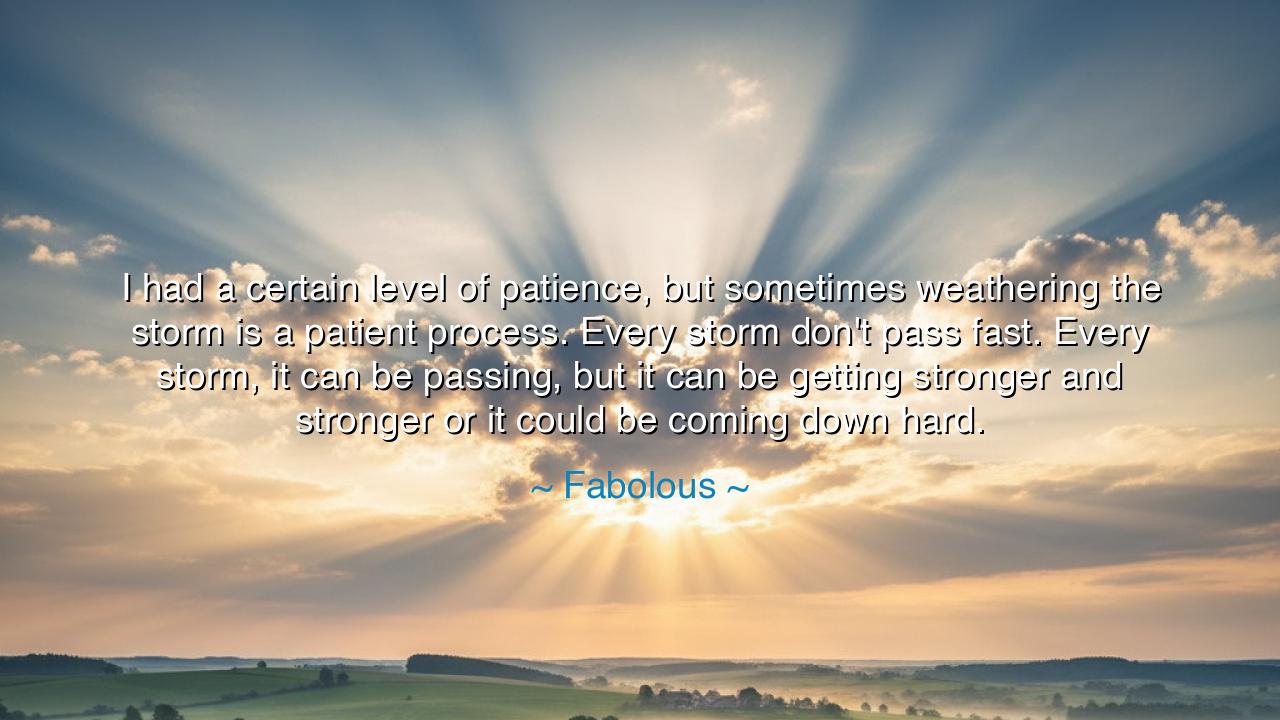
I had a certain level of patience, but sometimes weathering the
I had a certain level of patience, but sometimes weathering the storm is a patient process. Every storm don't pass fast. Every storm, it can be passing, but it can be getting stronger and stronger or it could be coming down hard.






Hear the words of Fabolous, who in his reflection gave voice to the trials of life itself: “I had a certain level of patience, but sometimes weathering the storm is a patient process. Every storm don’t pass fast. Every storm, it can be passing, but it can be getting stronger and stronger or it could be coming down hard.” Though simple in speech, these words carry the depth of ancient wisdom, for they remind us that hardship is not a moment but a season, and endurance is not a single act but a continual practice.
He speaks first of patience, that virtue which is tested most not in times of peace, but in times of tempest. To endure a storm is not only to withstand its first strike, but to remain steadfast when it lingers, when it grows stronger, when it tests the very limits of one’s spirit. Many boast of patience, but true patience is revealed only when the storm refuses to end. In such times, one must not only stand, but stand without knowing when the skies will clear.
The storm, in his saying, is more than wind and rain—it is the symbol of hardship, of loss, of betrayal, of failure, of the trials that sweep through every life. And as he teaches, every storm does not pass fast. Some burdens weigh for years; some griefs heal only slowly; some struggles intensify before they ease. Just as a hurricane may gather strength before it fades, so too may life’s hardships press harder before they relent. To recognize this truth is to prepare the heart: do not expect the storm to obey your timing, but learn to adjust your spirit to its rhythm.
History gives us mirrors of this lesson. Think of Abraham Lincoln, who before rising to leadership faced failure in business, defeat in elections, and the weight of deep personal sorrow. His storms did not pass quickly—each seemed to deepen before it eased. Yet by enduring them, he was shaped into the man who could stand unbroken through the storm of civil war, guiding a fractured nation with courage. Without his long years of patience, his greatness could never have been forged.
Fabolous reminds us also that a storm is not a sign of doom, but of testing. For though the rain may fall hard, and though the winds may roar, storms always end. No tempest is eternal, but the strength you gain in its midst will endure. It is not the storm that defines you, but how you weather it. Do you panic and collapse when the clouds gather, or do you plant your feet and endure until the light breaks through?
The deeper wisdom is this: patience in the storm is not passive. It is active endurance, the steady work of holding on, of adjusting, of preparing for the dawn even when night feels endless. To wait without despair, to suffer without surrender, to hope when all seems lost—this is the patient process of weathering the storm. And in this process, the soul is refined, made stronger than steel.
The lesson is clear: expect storms, but do not expect them to be brief. Prepare yourself not for moments of trial, but for seasons of endurance. Strengthen your spirit daily, so that when hardship comes, you will not break. Seek wisdom from those who endured long struggles, and draw courage from their example. And when the storm rages, remind yourself: though it may last longer than you wish, it cannot last forever. Stand firm, and you will outlast it.
Thus, Fabolous’ words are a reminder to all: storms may come harder and longer than you imagine, but with patience, you can endure them. And when the skies clear, you will not be the same—you will be stronger, wiser, and more prepared for the storms yet to come.






AAdministratorAdministrator
Welcome, honored guests. Please leave a comment, we will respond soon